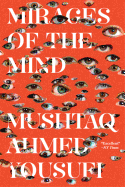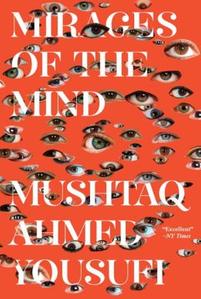

Mirages of the Mind is composed of five novellas, creating one long mosaic of hundreds of tiny stories, anecdotes and domestic comedies spanning some 70 years, centered on Mushtaq's dear friend Basharat and his many disasters. Basharat is a schoolteacher obsessed with horses and is constantly repairing his worthless car. He is surrounded by his devoted father, his quarrelsome father-in-law, his secretary (formerly a preacher), his driver (formerly a barber) and his moneylender (who moves in until Basharat can repay him). These men care more about lumber, horses, hookahs, poetry and each other than they do about chasing women. Female characters are few, brief and unnamed, referred to only as somebody's wife or somebody's daughter. In spite of this, when Basharat loses his unnamed wife of 45 years, he is devastated.
Some stories are told by Basharat, and others are told about Basharat by his friend Mushtaq. One vignette leads to another in an associative spiral of digressions and narrators until it's hard to know exactly who's talking or where or why. What continues to draw the reader onward through this dense and frequently hilarious confusion is Yousufi's voice, loving and ironic at the same time, delighted with the process of storytelling itself. He alternates wisdom with humor, pathos and pratfalls.
The first novella is about Basharat's foul-tempered father-in-law, who causes so much trouble he ends up in jail. The second centers on Basharat's obsession with owning a handsome horse and carriage. The middle one concerns the purchase of an automobile and its combination with a truck into something halfway between the two. The fourth novella is set decades later and tells of a return visit to Basharat's home town in India, featuring old Master Aasi, who confuses everyone by insisting he's a Buddhist. The last goes back to Basharat's initial days as a schoolteacher, when his village school hosts a poetry festival.
Yousufi's stories are frequently laced with words left untranslated describing special types of music, food, clothing, furniture, poetry and singing, all without a glossary, but even when what's happening is unclear, the author's sense of humor and good nature shine through. Yousufi has opinions on the value of college education, the moral conduct of dogs, the joys of ailing and why Jewish prophets all rode donkeys. He brings to life a world where machine guns are taken to weddings and where poor women dye their dung-covered floors to look like carpets. His comical storytelling is deftly captured in this English translation, providing a lighthearted (if unguided) plunge into one of the treasures of contemporary Pakistani culture. --Nick DiMartino, Nick's Picks, University Book Store, Seattle, Wash.
Shelf Talker: The first English translation of a novel by the revered 92-year-old Pakistani writer showcases the comic misadventures of a schoolteacher with a weakness for horses and cars.

